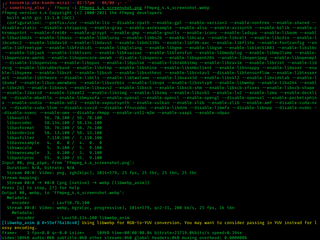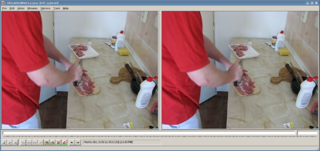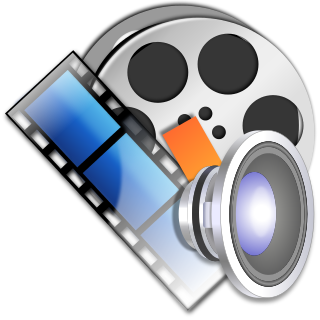
FFmpeg is a free and open-source software project consisting of a suite of libraries and programs for handling video, audio, and other multimedia files and streams. At its core is the command-line ffmpeg tool itself, designed for processing of video and audio files. It is widely used for format transcoding, basic editing, video scaling, video post-production effects and standards compliance.

VirtualDub is a free and open-source video capture and video processing utility for Microsoft Windows written by Avery Lee. It is designed to process linear video streams, including filtering and recompression. It uses AVI container format to store captured video. The first version of VirtualDub, written for Windows 95, to be released on SourceForge was uploaded on August 20, 2000.

VirtualDubMod was an open-source video capture and processing tool for Microsoft Windows, based on Avery Lee's VirtualDub.

DirectShow, codename Quartz, is a multimedia framework and API produced by Microsoft for software developers to perform various operations with media files or streams. It is the replacement for Microsoft's earlier Video for Windows technology. Based on the Microsoft Windows Component Object Model (COM) framework, DirectShow provides a common interface for media across various programming languages, and is an extensible, filter-based framework that can render or record media files on demand at the request of the user or developer. The DirectShow development tools and documentation were originally distributed as part of the DirectX SDK. Currently, they are distributed as part of the Windows SDK.

ffdshow is an open-source unmaintained codec library that is mainly used for decoding of video in the MPEG-4 ASP and H.264/MPEG-4 AVC video formats, but it supports numerous other video and audio formats as well. It is free software released under GNU General Public License 2.0, runs on Windows, and is implemented as a Video for Windows (VFW) codec and a DirectShow filter.

Indeo Video is a family of audio and video formats and codecs first released in 1992, and designed for real-time video playback on desktop CPUs. While its original version was related to Intel's DVI video stream format, a hardware-only codec for the compression of television-quality video onto compact discs, Indeo was distinguished by being one of the first codecs allowing full-speed video playback without using hardware acceleration. Also unlike Cinepak and TrueMotion S, the compression used the same Y'CbCr 4:2:0 colorspace as the ITU's H.261 and ISO's MPEG-1. Indeo use was free of charge to allow for broadest usage.

The Combined Community Codec Pack, more commonly referred to by its acronym CCCP, is a collection of codecs packed for Microsoft Windows, designed originally for the playback of anime fansubs. The CCCP was developed and maintained by members of various fansubbing groups.
libavcodec is a free and open-source library of codecs for encoding and decoding video and audio data.
DirectVobSub is a software add-on for Microsoft Windows that is able to read external subtitle files and superimposes them on a playing video file.

K-Multimedia Player is an Adware-supported media player for Windows and iOS that can play most current audio and video formats, including VCD, HDML, DVD, AVI, MKV, Ogg, OGM, 3GP, MPEG-1/2/4, AAC, WMA 7, 8, WMV, RealMedia, FLV and QuickTime.

Sandboxie is an open-source OS-level virtualization solution for Microsoft Windows. It is a sandboxing solution that creates an isolated operating environment in which applications can run without permanently modifying the local system. This virtual environment allows for controlled testing of untrusted programs and web surfing.
Video Decode and Presentation API for Unix (VDPAU) is a royalty-free application programming interface (API) as well as its implementation as free and open-source library distributed under the MIT License. VDPAU is also supported by Nvidia.
The K-Lite Codec Pack is a collection of audio and video codecs for Microsoft Windows DirectShow that enables an operating system and its software to play various audio and video formats generally not supported by the operating system itself. The K-Lite Codec Pack also includes several related tools, including Media Player Classic Home Cinema (MPC-HC), Media Info Lite, and Codec Tweak Tool.
Multi view Video Coding is a stereoscopic video coding standard for video compression that allows for encoding of video sequences captured simultaneously from multiple camera angles in a single video stream. It uses the 2D plus Delta method and is an amendment to the H.264 video compression standard, developed jointly by MPEG and VCEG, with contributions from a number of companies, primarily Panasonic and LG Electronics.

SMPlayer is a cross-platform graphical front-end for MPlayer and mpv and forks of Mplayer using GUI widgets offered by Qt. SMPlayer is free and open-source software subject to the terms of the GNU General Public License version 2 or later. SMplayer has been localized in more than 30 languages.

MediaInfo is a free, cross-platform and open-source program that displays technical information about media files, as well as tag information for many audio and video files. It is used in many programs such as XMedia Recode, MediaCoder, eMule, and K-Lite Codec Pack. It can be easily integrated into any program using a supplied MediaInfo.dll. MediaInfo supports popular video formats as well as lesser known or emerging formats. In 2012 MediaInfo 0.7.57 was also distributed in the PortableApps format.
Intel Quick Sync Video is Intel's brand for its dedicated video encoding and decoding hardware core. Quick Sync was introduced with the Sandy Bridge CPU microarchitecture on 9 January 2011 and has been found on the die of Intel CPUs ever since.

mpv is free and open-source media player software based on MPlayer, mplayer2 and FFmpeg. It runs on several operating systems, including Unix-like operating systems and Microsoft Windows, along with having an Android port called mpv-android. It is cross-platform, running on ARM, PowerPC, x86/IA-32, x86-64, and MIPS architecture.
OpenH264 is a free software library for real-time encoding and decoding video streams in the H.264/MPEG-4 AVC format. It is released under the terms of the Simplified BSD License.
Versatile Video Coding (VVC), also known as H.266, ISO/IEC 23090-3, and MPEG-I Part 3, is a video compression standard finalized on 6 July 2020, by the Joint Video Experts Team (JVET), a joint video expert team of the VCEG working group of ITU-T Study Group 16 and the MPEG working group of ISO/IEC JTC 1/SC 29. It is the successor to High Efficiency Video Coding. It was developed with two primary goals – improved compression performance and support for a very broad range of applications.











